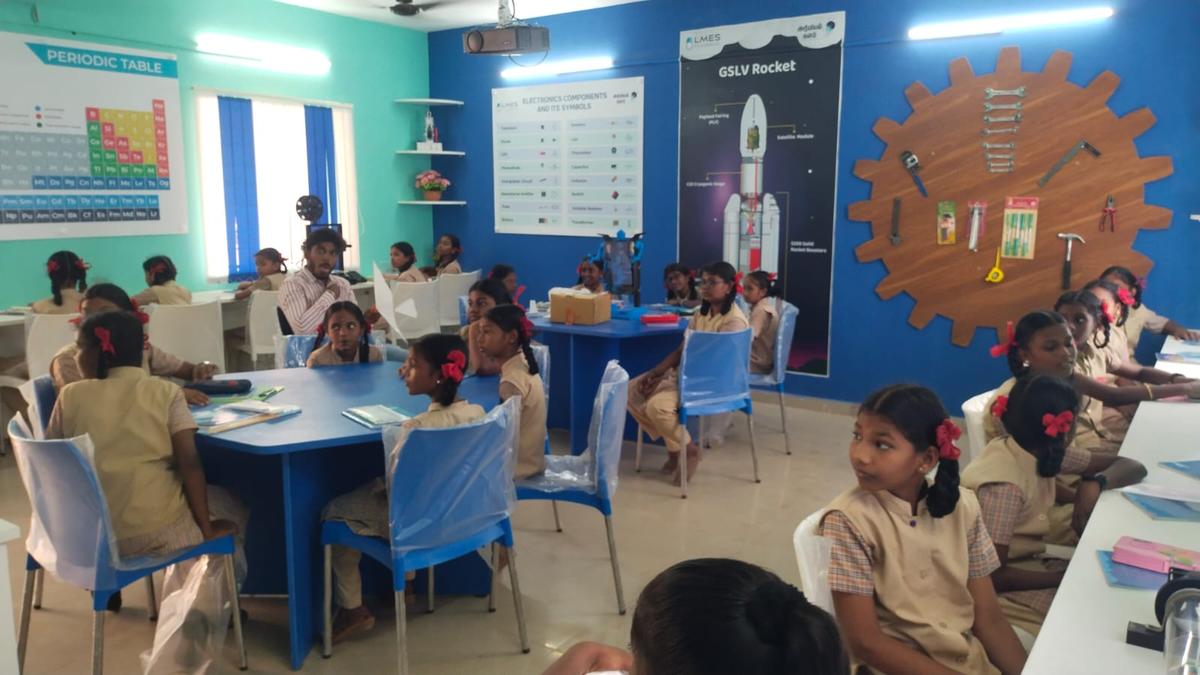
Don Bosco alumni ‘gift’ a STEM lab to a government school
The Hindu
With Grundfos India’s support, old students of Don Bosco School in Chennai establish the facility at a girls school in Choolaimedu
Learning at Jaigopal Garodia Government Girls’ Higher Secondary School in Choolaimedu has been enhanced by a STEM lab that was unwrapped recently, a few days removed from International Day of Women and Girls in Science. The first classes pertaining to STEM lab teaching took place on February 21.
Grundfos Pumps India Pvt Ltd., and Don Bosco Egmore 1997 batch alumni are the architects of this social initiative. Bringing LMES Foundation into the picture, they have designed a three-year hands-on programme for 50 students in Grades 6 and 7, focusing on basic to advanced STEM concepts including physics, electronics, robotics, AI and aerospace, says a communication from the DB 1997 alumni group. The communication further notes that the initiative was driven by Don Bosco 1997 batch alumnus and Thousand Lights MLA Dr. Ezhilan (who is also a member of the 1997 DB), as a step towards achieving the State Government’s mission of bridging the gender ratio gap in the STEM workforce.
This intervention gives the DB 1997 batch a “fifer” — five social initiatives in as many years.
“In 2021, during the pandemic when education went online, the 1997 DB batch alumni mobilised 150 laptops for students of an Adi Dravidar school. When education returned to physical classrooms, for three years on the trot, from 2022 to 2024, the batch came together to build classrooms in government schools. The batch aims at one social project every year. And every time, the natch has made a contribution, YRG Care would match that contribution. Dr. Sunil Suhas Solomon, chairman and manging trustee, YRG Care, is a member of the 1997 DB batch. Sunil is with John Hopkins University School of Medicine, USA but heads the YRG Care foundation,” elaborates Deepu Anthony, a member of the batch.
On why the batch steered away from what seemed to be a pattern of social intervention — establishing classrooms at a government school — Deepu says: “Ezhilan called me one day and apprised me about how the government is trying to bridge the gender gap in the STEM workforce. He sought to find out if the DB 1997 batch could do something that would contribute to efforts in this direction by the government. We took the idea to the batch and formed a core team for this initiative; and we decided that the gender gap in STEM workforce should be addressed at the school level, and that too in a government school. Generally, students in government schools are not aware of the application of the courses they can take up. We decided we should set up a STEM lab and design a programme that would allow for specialised teams to step in and explain the applications of various STEM-related courses. It had to be a long-term investment in these students. When we told Ezhilan about our plan, his team evaluated a few schools in his constituency and chose Jaigopal Garodia Government Girls’ Higher Secondary School because of the enthusiasm towards the idea evinced by the HM and science teachers in the school.”
At the heart of the three-year application-oriented programme is an effort to make students curious about STEM concepts and provide them with the resources to master them, says Deepu. “This programme is an experiment we are carrying out with Jaigopal Garodia Government Girls’ Higher Secondary School. Analysing the measurable outcomes, we will see how this programme can be taken to other state government schools,” notes Deepu. “We decided to bring LMES Foundation on board as the implementation partner, as its parent company LMES Academy is engaged in the work of establishing STEM labs in private schools. The Foundation has been conducting a one-day STEM education orientation visiting government schools.”
According to the communication the DB 1997 batch shared with The Hindu Downtown, as part of the three-year programme, the students would have sessions by industry experts, and participate in industry visits. They would also be given career guidance in the 10th and 12th grade and be eligible to apply to LMES Foundation’s college education scholarship programme. The communication further adds that the project sponsors, Grundfos and the Don Bosco alumni and the implementation partner LMES Foundation, believe that this initiative would have measurable impact not just on the learning outcome dimension, but also on the number of girl students who enroll for the Science stream in the 11th grade, and thereafter when they need to choose a course in college.













